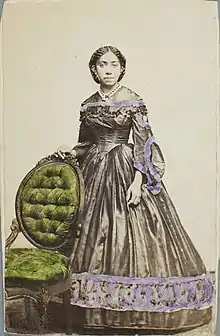Virginia Hewlett Douglass
Virginia Hewlett Douglass (1849–1889), also known as Virginia Lewis Molyneaux Hewlett Douglass was an African-American suffragist.[1] She had been married to Frederick Douglass, Jr.[2]

Biography
Virginia Lewis Molyneaux Hewlett was born June 1, 1849 in Cambridge, Massachusetts.[3][4] She was the daughter of the first African American instructor at Harvard University (from 1859 to circa 1871), Aaron Molyneaux Hewlett and physical education instructor, Virginia Josephine Lewis Molyneaux Hewlett (c.1821–1882).[5][4]
On August 4, 1869, Virginia Hewlett Douglass married Frederick Douglass, Jr. in Cambridge.[6][4][7] Together they had seven children, Fredrick Aaron Douglass (1870–1886), Virginia Anna Douglass (1871–1872), Lewis Emmanuel Douglass (c.1874–1875), Maud Ardell Douglass (1877–1877), Gertrude Pearl Douglass (1883–1887), Robert Smalls Douglass (1886–1910), Charles Paul Douglass (1879–1895).[4] When her sister-in-law Mary Elizabeth Murphy (married to Charles Remond Douglass) died in 1879, Virginia and Fredrick raised their two minor children Charles Frederick and Joseph Henry.
In 1877, a petition for women's suffrage support by the District of Columbia African-American community was created and signed by Virginia Hewlett Douglass, Frederick Douglass, Jr., Nathan Sprague, and Rosetta Douglass Sprague.[8][9] The petition had been part of a movement organized by National Woman Suffrage Association.[9]
On September 21, 1881, Douglass wrote a letter to the editor, to the Washington Sunday Item newspaper against school segregation and prejudice.[4]
She died in December 14, 1889 at age 41, her death was listed as consumption.[10][11][12] She was buried in Graceland Cemetery[10] and later moved to Woodlawn Cemetery in Washington DC. After her death, her brother Emanuel D. Molyneaux Hewlett took custody of her two minor children, Charles Paul and Robert Smalls.[12]
References
- "Virginia Hewlett Douglass". Alexander Street Documents. Retrieved 2020-11-28.
- "These Photo Albums Offer a Rare Glimpse of 19th-Century Boston's Black Community". Smithsonian Magazine. Retrieved 2020-11-28.
- Fought, Leigh (2017). Women in the World of Frederick Douglass. Oxford University Press. p. 310. ISBN 9780199782611.
- Bernier, Celeste-Marie (2018-07-31). If I Survive: Frederick Douglass and Family in the Walter O. Evans Collection. Edinburgh University Press. pp. 26–28, 49, 629. ISBN 978-1-4744-3973-2.
- "General information about Aaron Molyneaux Hewlett and Madam Molyneaux Hewlett, 1861-". Hollis, Harvard University. Retrieved 2020-11-28.
- "Untitled". Evening Gazette. August 12, 1869 – via Alexander Street, Proquest.
- Gregory, James Monroe (1893). Frederick Douglass the Orator: Containing an Account of His Life; His Eminent Public Services; His Brilliant Career as Orator; Selections from His Speeches and Writings. Willey & Company. p. 200. ISBN 978-0-7950-1414-7.
- "Documented Rights Image Detail: Petition for Woman Suffrage Transcript". Archives.gov. Retrieved 2020-11-28.
- "Petition for Woman Suffrage from Frederick Douglass Jr. and Other Residents of the District of Columbia". DocsTeach. Retrieved 2020-11-28.
- "Mortuary Matters". Newspapers.com. Democrat and Chronicle. 22 December 1889. p. 2. Retrieved 2020-11-28.
- "Obituary". Leader newspaper, Washington DC. December 21, 1889. p. 2.
- Blight, David W. (2018-10-16). Frederick Douglass: Prophet of Freedom. Simon and Schuster. p. 678. ISBN 978-1-4165-9388-1.